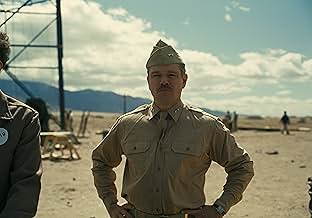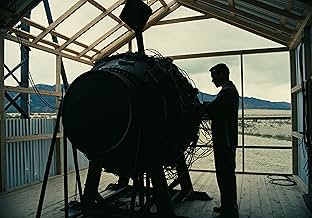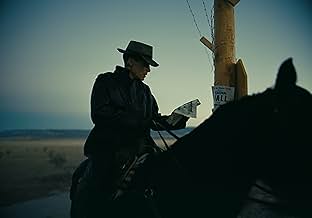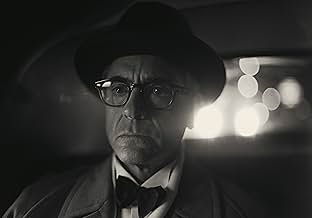La historia del científico J. Robert Oppenheimer y su rol en el desarrollo de la bomba atómica.La historia del científico J. Robert Oppenheimer y su rol en el desarrollo de la bomba atómica.La historia del científico J. Robert Oppenheimer y su rol en el desarrollo de la bomba atómica.
- Ganó 7 premios Óscar
- 355 premios y 369 nominaciones en total
Engineering 'Oppenheimer'
Engineering 'Oppenheimer'
Cillian Murphy and the cast of Oppenheimer discuss what it's like to work with a singular director like Christopher Nolan.
Argumento
¿Sabías que...?
- CuriosidadesIn order for the black and white sections of the movie to be shot in the same quality as the rest of the film, Kodak produced a limited supply of its Double-X black and white film stock in 70mm. This film stock was chosen specifically for its heritage - it was originally sold to photographers as Super-XX during World War II and was very popular with photojournalists of the era.
- PifiasThe stop signs are yellow in the film, which is accurate. The United States used yellow stop signs until 1954.
- Citas
J. Robert Oppenheimer: Albert? When I came to you with those calculations, we thought we might start a chain reaction that would destroy the entire world...
Albert Einstein: I remember it well. What of it?
J. Robert Oppenheimer: I believe we did.
- Versiones alternativasTo get a U/A rating certification in India, the movie was edited to remove or censor all nudity using CGI. For example, the scene where Tatlock and Oppenheimer have a conversation and the former character was topless, the nudity was censored with a CGI black dress. Many Middle Eastern countries use this exact same censored version for release.
- ConexionesFeatured in Louder with Crowder: Going Out with a Bang! (2022)
- Banda sonoraHoliday in Big Band Land
(uncredited)
Written by Gerhard Narholz
Performed by Les Brown and His Band of Renown
Reseña destacada
"Oppenheimer" is a biographical thriller film written and directed by Christopher Nolan ("The Dark Knight trilogy", "Inception", "Interstellar", "Dunkirk"), based on the biography "American Prometheus" by Kai Bird and Martin J. Sherwin. Starring Cillian Murphy in the lead role, in addition to Matt Damon, Robert Downey Jr, Emily Blunt, and Florence Pugh, it subverts the usual biopic formula to create a brilliantly layered examination of a man throughout all of his incredible accomplishments and fundamental flaws.
During the height of the Second World War, theoretical physicist J. Robert Oppenheimer (Cillian Murphy) is recruited by the United States government to oversee the "Manhattan Project", a top secret operation intended to develop the world's first nuclear weapons. After becoming acquainted with the project's director Major General Leslie Groves (Matt Damon), Oppenheimer and the General come to an agreement that the best place to carry out such an undertaking is the vast desert of Los Alamos, New Mexico. As numerous other scientists and their families are brought in to this discreet location, Oppenheimer works tirelessly around the clock to build this weapon of mass destruction before the Nazis can devise their own. With the War raging and personal troubles mounting, Oppenheimer continues to push himself to his utmost limits, but soon suffers the consequences of his dedication.
On August 6th, 1945, the atomic bomb "Little Boy" was dropped on the Japanese city of Hiroshima, making it the first time a nuclear weapon was used in an act of war. The dropping of this bomb and "Fat Man" in Nagasaki three days later was what essentially brought an end to World War II, and with it, began a frightening new era known as the "Atomic Age". To this day, it remains a contentious topic of discussion among many as to whether the ethical ramifications of these bombings are justified by what subsequently resulted from it. The one man whom most people pin all the blame on is J. Robert Oppenheimer, whose key role in the development of these weapons led to him being credited as "the father of the atomic bomb", a label which he carried as a heavy burden for the rest of his life. In Christopher Nolan's biopic "Oppenheimer", we are treated to an intricately structured and uniquely tragic analysis of this complex man's legacy and how it still affects everyone several decades later.
In true Christopher Nolan fashion, the story is not told as a conventional biopic but rather as a fragmented, non-sequential series of highlights pertaining to the title subject's life. When we are first introduced to J. Robert Oppenheimer, we see that he is an incredibly intelligent man whose sheer commitment to his craft earns him the utmost respect of many of his peers, even as a young student. However, almost immediately after, the film cuts to him on trial for allegedly having ties to communism, an accusation which threatens to completely derail the positive reputation bestowed upon him. As the judicial committee interrogates him with hard hitting questions, Oppenheimer is haunted by the errors of his own judgement, shown to the audience through flashbacks of varying length to pivotal times in his life. These scenes range from his fractured relationship with his wife to the remorse he has for placing his trust in the wrong people. This gives the viewer a first person perspective of what Oppenheimer's mind must have been processing during this intense period of his life, as he contemplates the very real possibility of having all of his hard work mitigated by these powerful government officials. It's hard to imagine any other director trying to convey so much information to their audience in such a fashion, but Nolan manages to work his magic in the best way possible, always striking the perfect balance of showcasing the triumphant rise and tragic fall of an imperfect man.
Another notable thing about Nolan's direction is his resourcefulness in the way he handles certain important scenes. One moment, which I won't speak about in too much detail, literally had me on the edge of my seat as we watch Oppenheimer and the rest of the scientists test out the prototype bombs with each explosion proving to be bigger than the last. Since Nolan has been vocal about his dislike of using CGI in his movies, he instead opts for more practical methods of showing the increasing power of these bombs. By reminding the audience that the Nazis could very well be working on their own weapon of mass destruction, there is a real sense of urgency flowing throughout these scenes, giving the scientists all the more reason to work even faster to beat the enemy at their own game. As each bomb explodes, it can be likened to a ticking clock, with each blast representing progression towards the end goal of perfecting the ultimate weapon. The creative use of editing during these scenes keeps things moving at a brisk pace, something especially necessary considering the film's three hour runtime. Nolan previously exhibited a similar method in 2017's "Dunkirk", which utilised the film's score in a clever way to show the audience how time is truly of the essence. Once again, Nolan has found a clever way around taking the easy route of using CG effects to tell a story, and keeps viewers on their toes by use of good old fashioned directorial proficiency.
For what can only be described as the performance of his career, Cillian Murphy brings everything necessary to the role of J. Robert Oppenheimer, a man so complex that I can't imagine the amount of pressure there was to play him this effectively. The combined efforts of both Murphy's acting and Nolan's direction help make Oppenheimer one of the most fascinating individuals of the 20th century. This is not a man who can be viewed simply at face value, as there are so many layers to his character that it bears an in-depth exploration that only a movie like this can accomplish. The film paints Oppenheimer as neither a hero nor a villain, but rather a complicated man whose human qualities undermine what he will be remembered for in the history books. Murphy approaches him like that of a Shakespearian figure, rife with flaws, haughtiness, and a sense of hubris that ends up sealing his inevitable fate. One scene may have you admiring his remarkable talents in the field of nuclear physics while another might cause you to hate him for his unfaithfulness to his family. He can be viewed simultaneously as a martyr and a scapegoat for the way in which he helped bring an end to the deadliest global conflict in history, while consequently ushering in something even worse.
The rest of the film's cast all did a fantastic job as well, with the standouts being Matt Damon, Robert Downey Jr, Emily Blunt, and Florence Pugh. Damon's take on Major General Leslie Groves is more than simply that of a stock military character but rather an important figure who seizes the opportunity to use Oppenheimer's talents to his advantage. We watch as Groves forms an unlikely alliance with the physicist, often questioning the ramifications of the theoretical nature in experimenting with nuclear power. Groves's ignorance to Oppenheimer's extensive scientific knowledge allows the audience to learn along with him when it is explained in basic detail. To that effect, he provides an important third party perspective to Oppenheimer's achievements.
It's also great to see Robert Downey Jr shine as Lewis Strauss, which is not only his best post-MCU role but one of his best roles in general. Strauss is a man who is not viewed favourably by history due to his role in exposing Oppenheimer's ties to communism. He holds such a grudge against Oppenheimer that you can practically consider him the true villain of this story. Downey takes every opportunity to show Strauss's two-faced nature, biding his time for the right moment to strip Oppenheimer from the record books and damage his reputation. Reportedly, Downey considers this his best role to date, and it definitely seems like he is putting everything he has into his performance.
Emily Blunt and Florence Pugh also contributed significantly as Kitty Oppenheimer and Jean Tatlock, respectively. Each of these two women represent something significant in Oppenheimer's life, with Kitty being who he should be with and Jean being who he personally wants to be with. This draws parallels to that of Oppenheimer choosing between acting on instinct or acting on intellect when assisting in the construction of the bomb, which again reminds the audience of his flawed human qualities. It can be difficult to give up following your heart but when the fate of the world rests on your pragmatic decision making, sometimes you have no other choice.
As a biopic and a Christopher Nolan film, "Oppenheimer" exceeds virtually all expectations to become one of the very best in both fields. There are few films that are able to tackle such subject matter in this much detail while also remaining entertaining the whole way through. I guess sometimes all it takes is one brave, risk-taking filmmaker to prove that this really is a possible task. We need more films like this to inspire thoughtful, creative discussion and it is comforting to know that someone like Nolan is here to help keep them in the mainstream. After all, it's a tough job, but someone's got to do it for us.
I rate it a perfect 10/10.
During the height of the Second World War, theoretical physicist J. Robert Oppenheimer (Cillian Murphy) is recruited by the United States government to oversee the "Manhattan Project", a top secret operation intended to develop the world's first nuclear weapons. After becoming acquainted with the project's director Major General Leslie Groves (Matt Damon), Oppenheimer and the General come to an agreement that the best place to carry out such an undertaking is the vast desert of Los Alamos, New Mexico. As numerous other scientists and their families are brought in to this discreet location, Oppenheimer works tirelessly around the clock to build this weapon of mass destruction before the Nazis can devise their own. With the War raging and personal troubles mounting, Oppenheimer continues to push himself to his utmost limits, but soon suffers the consequences of his dedication.
On August 6th, 1945, the atomic bomb "Little Boy" was dropped on the Japanese city of Hiroshima, making it the first time a nuclear weapon was used in an act of war. The dropping of this bomb and "Fat Man" in Nagasaki three days later was what essentially brought an end to World War II, and with it, began a frightening new era known as the "Atomic Age". To this day, it remains a contentious topic of discussion among many as to whether the ethical ramifications of these bombings are justified by what subsequently resulted from it. The one man whom most people pin all the blame on is J. Robert Oppenheimer, whose key role in the development of these weapons led to him being credited as "the father of the atomic bomb", a label which he carried as a heavy burden for the rest of his life. In Christopher Nolan's biopic "Oppenheimer", we are treated to an intricately structured and uniquely tragic analysis of this complex man's legacy and how it still affects everyone several decades later.
In true Christopher Nolan fashion, the story is not told as a conventional biopic but rather as a fragmented, non-sequential series of highlights pertaining to the title subject's life. When we are first introduced to J. Robert Oppenheimer, we see that he is an incredibly intelligent man whose sheer commitment to his craft earns him the utmost respect of many of his peers, even as a young student. However, almost immediately after, the film cuts to him on trial for allegedly having ties to communism, an accusation which threatens to completely derail the positive reputation bestowed upon him. As the judicial committee interrogates him with hard hitting questions, Oppenheimer is haunted by the errors of his own judgement, shown to the audience through flashbacks of varying length to pivotal times in his life. These scenes range from his fractured relationship with his wife to the remorse he has for placing his trust in the wrong people. This gives the viewer a first person perspective of what Oppenheimer's mind must have been processing during this intense period of his life, as he contemplates the very real possibility of having all of his hard work mitigated by these powerful government officials. It's hard to imagine any other director trying to convey so much information to their audience in such a fashion, but Nolan manages to work his magic in the best way possible, always striking the perfect balance of showcasing the triumphant rise and tragic fall of an imperfect man.
Another notable thing about Nolan's direction is his resourcefulness in the way he handles certain important scenes. One moment, which I won't speak about in too much detail, literally had me on the edge of my seat as we watch Oppenheimer and the rest of the scientists test out the prototype bombs with each explosion proving to be bigger than the last. Since Nolan has been vocal about his dislike of using CGI in his movies, he instead opts for more practical methods of showing the increasing power of these bombs. By reminding the audience that the Nazis could very well be working on their own weapon of mass destruction, there is a real sense of urgency flowing throughout these scenes, giving the scientists all the more reason to work even faster to beat the enemy at their own game. As each bomb explodes, it can be likened to a ticking clock, with each blast representing progression towards the end goal of perfecting the ultimate weapon. The creative use of editing during these scenes keeps things moving at a brisk pace, something especially necessary considering the film's three hour runtime. Nolan previously exhibited a similar method in 2017's "Dunkirk", which utilised the film's score in a clever way to show the audience how time is truly of the essence. Once again, Nolan has found a clever way around taking the easy route of using CG effects to tell a story, and keeps viewers on their toes by use of good old fashioned directorial proficiency.
For what can only be described as the performance of his career, Cillian Murphy brings everything necessary to the role of J. Robert Oppenheimer, a man so complex that I can't imagine the amount of pressure there was to play him this effectively. The combined efforts of both Murphy's acting and Nolan's direction help make Oppenheimer one of the most fascinating individuals of the 20th century. This is not a man who can be viewed simply at face value, as there are so many layers to his character that it bears an in-depth exploration that only a movie like this can accomplish. The film paints Oppenheimer as neither a hero nor a villain, but rather a complicated man whose human qualities undermine what he will be remembered for in the history books. Murphy approaches him like that of a Shakespearian figure, rife with flaws, haughtiness, and a sense of hubris that ends up sealing his inevitable fate. One scene may have you admiring his remarkable talents in the field of nuclear physics while another might cause you to hate him for his unfaithfulness to his family. He can be viewed simultaneously as a martyr and a scapegoat for the way in which he helped bring an end to the deadliest global conflict in history, while consequently ushering in something even worse.
The rest of the film's cast all did a fantastic job as well, with the standouts being Matt Damon, Robert Downey Jr, Emily Blunt, and Florence Pugh. Damon's take on Major General Leslie Groves is more than simply that of a stock military character but rather an important figure who seizes the opportunity to use Oppenheimer's talents to his advantage. We watch as Groves forms an unlikely alliance with the physicist, often questioning the ramifications of the theoretical nature in experimenting with nuclear power. Groves's ignorance to Oppenheimer's extensive scientific knowledge allows the audience to learn along with him when it is explained in basic detail. To that effect, he provides an important third party perspective to Oppenheimer's achievements.
It's also great to see Robert Downey Jr shine as Lewis Strauss, which is not only his best post-MCU role but one of his best roles in general. Strauss is a man who is not viewed favourably by history due to his role in exposing Oppenheimer's ties to communism. He holds such a grudge against Oppenheimer that you can practically consider him the true villain of this story. Downey takes every opportunity to show Strauss's two-faced nature, biding his time for the right moment to strip Oppenheimer from the record books and damage his reputation. Reportedly, Downey considers this his best role to date, and it definitely seems like he is putting everything he has into his performance.
Emily Blunt and Florence Pugh also contributed significantly as Kitty Oppenheimer and Jean Tatlock, respectively. Each of these two women represent something significant in Oppenheimer's life, with Kitty being who he should be with and Jean being who he personally wants to be with. This draws parallels to that of Oppenheimer choosing between acting on instinct or acting on intellect when assisting in the construction of the bomb, which again reminds the audience of his flawed human qualities. It can be difficult to give up following your heart but when the fate of the world rests on your pragmatic decision making, sometimes you have no other choice.
As a biopic and a Christopher Nolan film, "Oppenheimer" exceeds virtually all expectations to become one of the very best in both fields. There are few films that are able to tackle such subject matter in this much detail while also remaining entertaining the whole way through. I guess sometimes all it takes is one brave, risk-taking filmmaker to prove that this really is a possible task. We need more films like this to inspire thoughtful, creative discussion and it is comforting to know that someone like Nolan is here to help keep them in the mainstream. After all, it's a tough job, but someone's got to do it for us.
I rate it a perfect 10/10.
- MrDHWong
- 19 jul 2023
- Enlace permanente
Selecciones populares
Inicia sesión para calificar y añadir a tu lista para recibir recomendaciones personalizadas
Detalles
- Fecha de lanzamiento
- Países de origen
- Sitios oficiales
- Idiomas
- Títulos en diferentes países
- Oppengeymer
- Localizaciones del rodaje
- Los Alamos, Nuevo México, EE.UU.(only interiors, Los Alamos facilities interiors, including Oppenheimer's house, Fuller Lodge Interior and Exterior)
- Empresas productoras
- Ver más compañías en los créditos en IMDbPro
Taquilla
- Presupuesto
- 100.000.000 US$ (estimación)
- Recaudación en Estados Unidos y Canadá
- 329.862.540 US$
- Fin de semana de estreno en EE. UU. y Canadá
- 82.455.420 US$
- 23 jul 2023
- Recaudación en todo el mundo
- 975.594.978 US$
- Duración3 horas
- Color
- Mezcla de sonido
Contribuir a esta página
Sugerir un cambio o añadir el contenido que falta












































